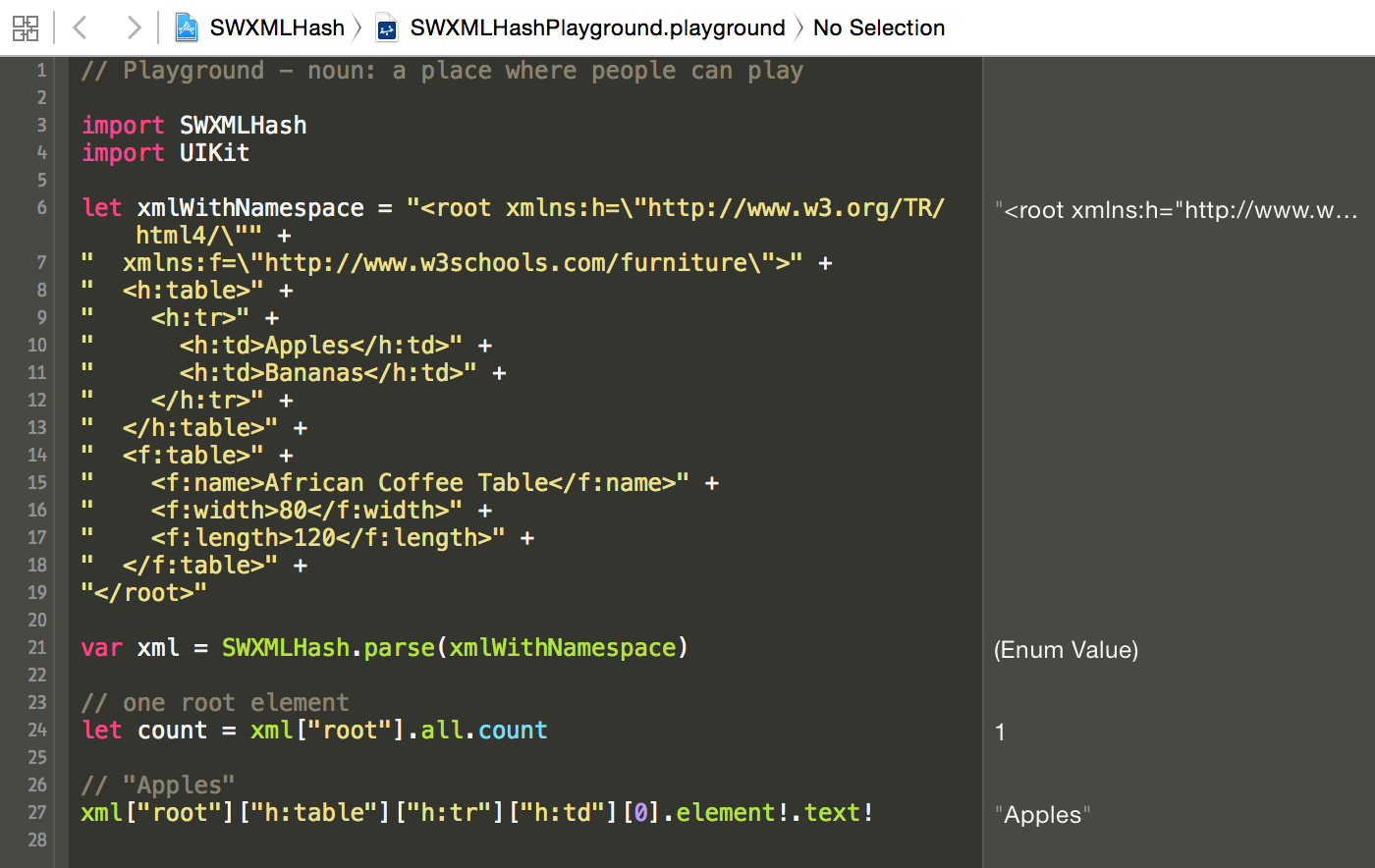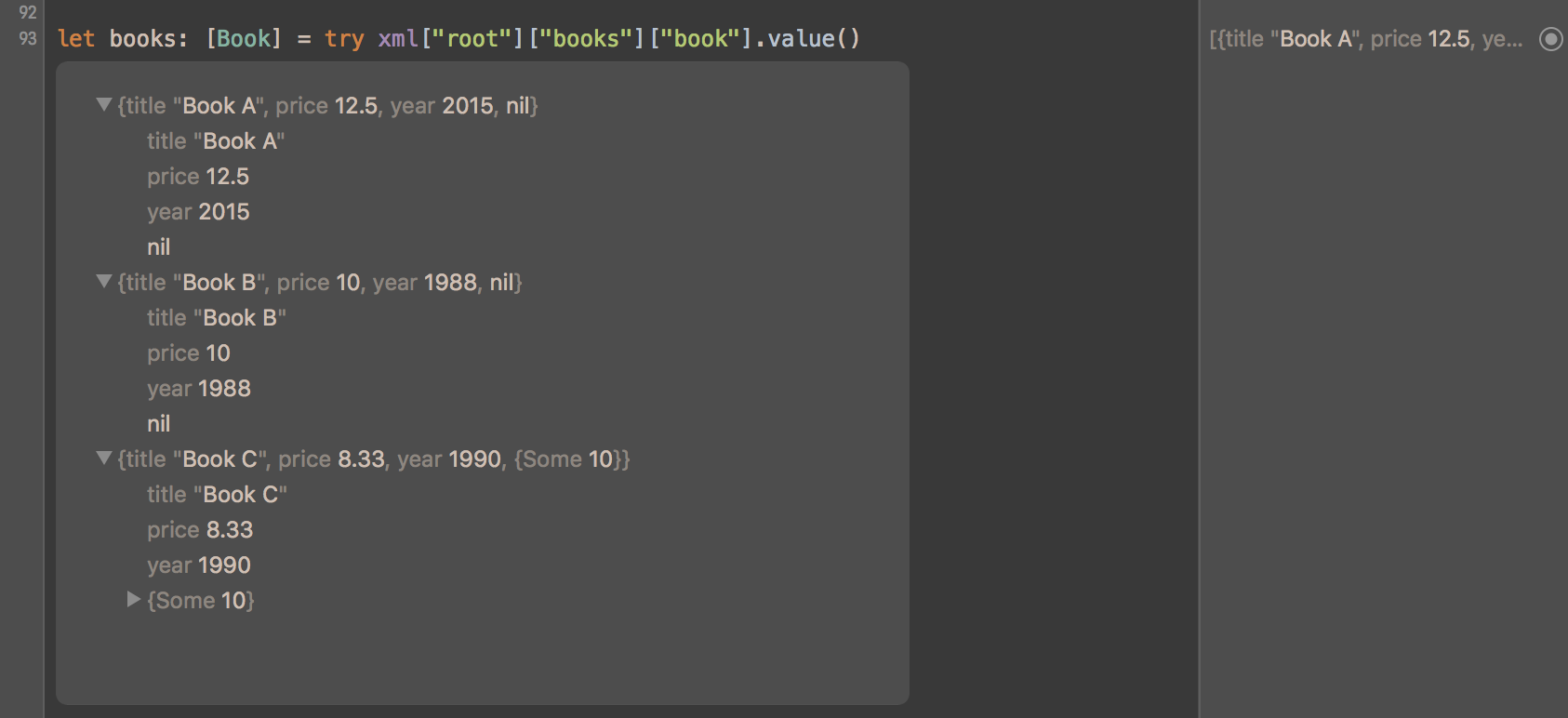SWXMLHash is a relatively simple way to parse XML in Swift. If you're familiar
with XMLParser (formerly NSXMLParser), this library is a wrapper around it. Conceptually, it
provides a translation from XML to a dictionary of arrays (aka hash).
The API takes a lot of inspiration from SwiftyJSON.
- iOS 8.0+ / Mac OS X 10.9+ / tvOS 9.0+ / watchOS 2.0+
- Xcode 8.0+
SWXMLHash can be installed using Swift Package Manager, CocoaPods, Carthage, or manually.
The Swift Package Manager is a tool built by Apple as part of the Swift project for integrating libraries and frameworks into your Swift apps.
To add SWXMLHash as a dependency, update the dependencies in your Package.swift to include a reference like so:
dependencies: [
.package(url: "https://github.com/drmohundro/SWXMLHash.git", from: "7.0.0")
]swift build should then pull in and compile SWXMLHash to begin using.
To install CocoaPods, run:
gem install cocoapodsThen create a Podfile with the following contents:
platform :ios, '10.0'
use_frameworks!
target 'YOUR_TARGET_NAME' do
pod 'SWXMLHash', '~> 7.0.0'
endFinally, run the following command to install it:
pod installTo install Carthage, run (using Homebrew):
brew update
brew install carthageThen add the following line to your Cartfile:
github "drmohundro/SWXMLHash" ~> 7.0
To install manually, you'll need to clone the SWXMLHash repository. You can do this in a separate directory, or you can make use of git submodules - in this case, git submodules are recommended so that your repository has details about which commit of SWXMLHash you're using. Once this is done, you can just drop all of the relevant swift files into your project.
If you're using a workspace, though, you can include the entire SWXMLHash.xcodeproj.
If you're just getting started with SWXMLHash, I'd recommend cloning the repository down and opening the workspace. I've included a Swift playground in the workspace which makes it easy to experiment with the API and the calls.
SWXMLHash allows for limited configuration in terms of its approach to parsing.
To set any of the configuration options, you use the configure method, like
so:
let xml = XMLHash.config {
config in
// set any config options here
}.parse(xmlToParse)The available options at this time are:
shouldProcessLazily- This determines whether not to use lazy loading of the XML. It can significantly increase the performance of parsing if your XML is large.
- Defaults to
false
shouldProcessNamespaces- This setting is forwarded on to the internal
NSXMLParserinstance. It will return any XML elements without their namespace parts (i.e. "<h:table>" will be returned as "<table>") - Defaults to
false
- This setting is forwarded on to the internal
caseInsensitive- This setting allows for key lookups to be case-insensitive. Typically, XML is a case-sensitive language, but this option lets you bypass this if necessary.
- Defaults to
false
encoding- This setting allows for explicitly specifying the character encoding when an
XML string is passed to
parse. - Defaults to
String.encoding.utf8
- This setting allows for explicitly specifying the character encoding when an
XML string is passed to
userInfo- This setting mimics
Codable'suserInfoproperty to allow the user to add contextual information that will be used for deserialization. - See Codable's userInfo docs
- The default is [:]
- This setting mimics
detectParsingErrors- This setting attempts to detect XML parsing errors.
parsewill return anXMLIndexer.parsingErrorif any parsing issues are found. - Defaults to
false(because of backwards compatibility and because many users attempt to parse HTML with this library)
- This setting attempts to detect XML parsing errors.
All examples below can be found in the included specs.
let xml = XMLHash.parse(xmlToParse)Alternatively, if you're parsing a large XML file and need the best performance, you may wish to configure the parsing to be processed lazily. Lazy processing avoids loading the entire XML document into memory, so it could be preferable for performance reasons. See the error handling for one caveat regarding lazy loading.
let xml = XMLHash.config {
config in
config.shouldProcessLazily = true
}.parse(xmlToParse)The above approach uses the config method, but there is also a lazy method
directly off of XMLHash.
let xml = XMLHash.lazy(xmlToParse)Given:
<root>
<header>
<title>Foo</title>
</header>
...
</root>Will return "Foo".
xml["root"]["header"]["title"].element?.textGiven:
<root>
...
<catalog>
<book><author>Bob</author></book>
<book><author>John</author></book>
<book><author>Mark</author></book>
</catalog>
...
</root>The below will return "John".
xml["root"]["catalog"]["book"][1]["author"].element?.textGiven:
<root>
...
<catalog>
<book id="1"><author>Bob</author></book>
<book id="123"><author>John</author></book>
<book id="456"><author>Mark</author></book>
</catalog>
...
</root>The below will return "123".
xml["root"]["catalog"]["book"][1].element?.attribute(by: "id")?.textAlternatively, you can look up an element with specific attributes. The below will return "John".
xml["root"]["catalog"]["book"].withAttribute("id", "123")["author"].element?.textGiven:
<root>
...
<catalog>
<book><genre>Fiction</genre></book>
<book><genre>Non-fiction</genre></book>
<book><genre>Technical</genre></book>
</catalog>
...
</root>The all method will iterate over all nodes at the indexed level. The code
below will return "Fiction, Non-fiction, Technical".
", ".join(xml["root"]["catalog"]["book"].all.map { elem in
elem["genre"].element!.text!
})You can also iterate over the all method:
for elem in xml["root"]["catalog"]["book"].all {
print(elem["genre"].element!.text!)
}Given:
<root>
<catalog>
<book>
<genre>Fiction</genre>
<title>Book</title>
<date>1/1/2015</date>
</book>
</catalog>
</root>The below will print "root", "catalog", "book", "genre", "title", and "date"
(note the children method).
func enumerate(indexer: XMLIndexer) {
for child in indexer.children {
print(child.element!.name)
enumerate(child)
}
}
enumerate(indexer: xml)Given:
<root>
<catalog>
<book id="bk101">
<author>Gambardella, Matthew</author>
<title>XML Developer's Guide</title>
<genre>Computer</genre><price>44.95</price>
<publish_date>2000-10-01</publish_date>
</book>
<book id="bk102">
<author>Ralls, Kim</author>
<title>Midnight Rain</title>
<genre>Fantasy</genre>
<price>5.95</price>
<publish_date>2000-12-16</publish_date>
</book>
<book id="bk103">
<author>Corets, Eva</author>
<title>Maeve Ascendant</title>
<genre>Fantasy</genre>
<price>5.95</price>
<publish_date>2000-11-17</publish_date>
</book>
</catalog>
</root>The following will return "Midnight Rain". Filtering can be by any part
of the XMLElement class or by index as well.
let subIndexer = xml!["root"]["catalog"]["book"]
.filterAll { elem, _ in elem.attribute(by: "id")!.text == "bk102" }
.filterChildren { _, index in index >= 1 && index <= 3 }
print(subIndexer.children[0].element?.text)Using Do-Catch with Errors:
do {
try xml!.byKey("root").byKey("what").byKey("header").byKey("foo")
} catch let error as IndexingError {
// error is an IndexingError instance that you can deal with
}Or using the existing indexing functionality:
switch xml["root"]["what"]["header"]["foo"] {
case .element(let elem):
// everything is good, code away!
case .xmlError(let error):
// error is an IndexingError instance that you can deal with
}Note that error handling as shown above will not work with lazy loaded XML. The
lazy parsing doesn't actually occur until the element or all method are
called - as a result, there isn't any way to know prior to asking for an element
if it exists or not.
Even more often, you'll want to deserialize an XML tree into an
array of custom types. This is where XMLObjectDeserialization
comes into play.
Given:
<root>
<books>
<book isbn="0000000001">
<title>Book A</title>
<price>12.5</price>
<year>2015</year>
<categories>
<category>C1</category>
<category>C2</category>
</categories>
</book>
<book isbn="0000000002">
<title>Book B</title>
<price>10</price>
<year>1988</year>
<categories>
<category>C2</category>
<category>C3</category>
</categories>
</book>
<book isbn="0000000003">
<title>Book C</title>
<price>8.33</price>
<year>1990</year>
<amount>10</amount>
<categories>
<category>C1</category>
<category>C3</category>
</categories>
</book>
</books>
</root>with Book struct implementing XMLObjectDeserialization:
struct Book: XMLObjectDeserialization {
let title: String
let price: Double
let year: Int
let amount: Int?
let isbn: Int
let category: [String]
static func deserialize(_ node: XMLIndexer) throws -> Book {
return try Book(
title: node["title"].value(),
price: node["price"].value(),
year: node["year"].value(),
amount: node["amount"].value(),
isbn: node.value(ofAttribute: "isbn"),
category : node["categories"]["category"].value()
)
}
}The below will return an array of Book structs:
let books: [Book] = try xml["root"]["books"]["book"].value()You can convert any XML to your custom type by implementing
XMLObjectDeserialization for any non-leaf node (e.g. <book> in the example
above).
For leaf nodes (e.g. <title> in the example above), built-in converters
support Int, Double, Float, Bool, and String values (both non- and
-optional variants). Custom converters can be added by implementing
XMLElementDeserializable.
For attributes (e.g. isbn= in the example above), built-in converters support
the same types as above, and additional converters can be added by implementing
XMLAttributeDeserializable.
Types conversion supports error handling, optionals and arrays. For more
examples, look into SWXMLHashTests.swift or play with types conversion
directly in the Swift playground.
Value deserialization is where a specific string value needs to be deserialized
into a custom type. So, date is a good example here - you'd rather deal with
date types than doing string parsing, right? That's what the XMLValueDeserialization
attribute is for.
Given:
<root>
<elem>Monday, 23 January 2016 12:01:12 111</elem>
</root>With the following implementation for Date value deserialization:
extension Date: XMLValueDeserialization {
public static func deserialize(_ element: XMLHash.XMLElement) throws -> Date {
let date = stringToDate(element.text)
guard let validDate = date else {
throw XMLDeserializationError.typeConversionFailed(type: "Date", element: element)
}
return validDate
}
public static func deserialize(_ attribute: XMLAttribute) throws -> Date {
let date = stringToDate(attribute.text)
guard let validDate = date else {
throw XMLDeserializationError.attributeDeserializationFailed(type: "Date", attribute: attribute)
}
return validDate
}
public func validate() throws {
// empty validate... only necessary for custom validation logic after parsing
}
private static func stringToDate(_ dateAsString: String) -> Date? {
let dateFormatter = DateFormatter()
dateFormatter.dateFormat = "EEEE, dd MMMM yyyy HH:mm:ss SSS"
return dateFormatter.date(from: dateAsString)
}
}The below will return a date value:
let dt: Date = try xml["root"]["elem"].value()No - SWXMLHash only handles parsing of XML. If you have a URL that has XML content on it, I'd recommend using a library like AlamoFire to download the content into a string and then parsing it.
No, not at the moment - SWXMLHash only supports parsing XML (via indexing, deserialization, etc.).
.value() is used for deserialization - you have to have something that
implements XMLObjectDeserialization (or XMLElementDeserializable if it is a
single element versus a group of elements) and that can handle deserialization
to the left-hand side of expression.
For example, given the following:
let dateValue: Date = try! xml["root"]["date"].value()You'll get an error because there isn't any built-in deserializer for Date.
See the above documentation on adding your own deserialization support. In this
case, you would create your own XMLElementDeserializable implementation for
Date. See above for an example of how to add your own Date deserialization
support.
Chances are very good that your XML content has what is called a "byte order
mark" or BOM. SWXMLHash uses NSXMLParser for its parsing logic and there are
issues with it and handling BOM characters. See
issue #65 for more details.
Others who have run into this problem have just stripped the BOM out of their
content prior to parsing.
Using extensions on classes instead of structs can result in some odd catches
that might give you a little trouble. For example, see
this question on StackOverflow
where someone was trying to write their own XMLElementDeserializable for
NSDate which is a class and not a struct. The XMLElementDeserializable
protocol expects a method that returns Self - this is the part that gets a
little odd.
See below for the code snippet to get this to work and note in particular the
private static func value<T>() -> T line - that is the key.
extension NSDate: XMLElementDeserializable {
public static func deserialize(_ element: XMLElement) throws -> Self {
guard let dateAsString = element.text else {
throw XMLDeserializationError.nodeHasNoValue
}
let dateFormatter = NSDateFormatter()
dateFormatter.dateFormat = "EEE, dd MMM yyyy HH:mm:ss zzz"
let date = dateFormatter.dateFromString(dateAsString)
guard let validDate = date else {
throw XMLDeserializationError.typeConversionFailed(type: "Date", element: element)
}
// NOTE THIS
return value(validDate)
}
// AND THIS
private static func value<T>(date: NSDate) -> T {
return date as! T
}
}Check out this great suggestion/example from @woolie up at #245.
This is related to #256 - XMLElement has actually been renamed
multiple times to attempt to avoid conflicts, but the easiest approach is to just scope it via XMLHash.XMLElement.
See #264 where this is discussed. The only change needed is to add the following import logic:
#if canImport(FoundationNetworking)
import FoundationNetworking
#endifFeel free to shoot me an email, post a question on StackOverflow, or open an issue if you think you've found a bug. I'm happy to try to help!
Another alternative is to post a question in the Discussions.
See CHANGELOG for a list of all changes and their corresponding versions.
See CONTRIBUTING for guidelines to contribute back to SWXMLHash.
SWXMLHash is released under the MIT license. See LICENSE for details.









